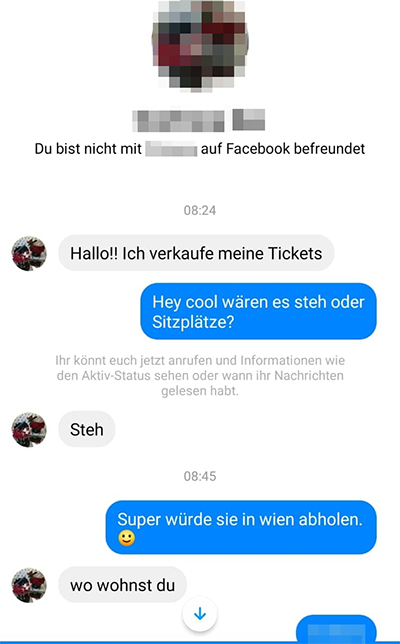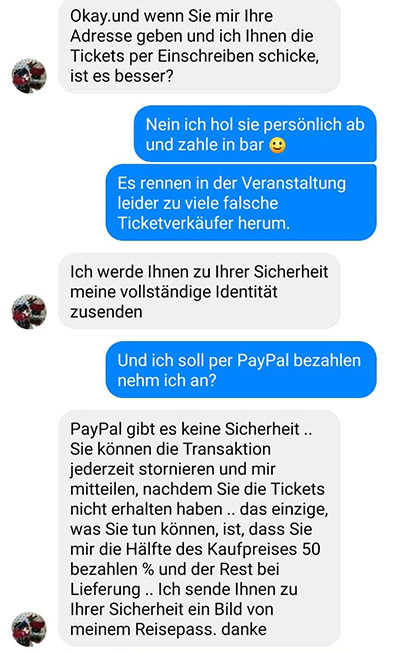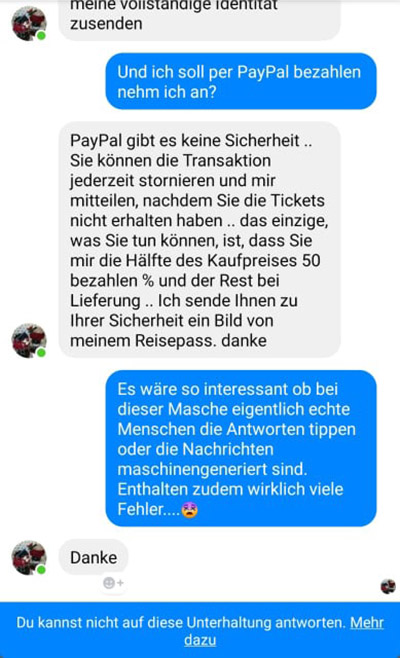On October 28, 2019, Mimikama published an article about the so-called “ triangle fraud ” via Ebay or PayPal with cell phone sales. These fraud attempts can now also be found in various paid events, such as concerts.
Fraud through advance payment is a problem that has existed for years, especially with the above-mentioned portals! Web tickets in particular have been frequently affected recently. What happened:
The author of this article wanted to attend a concert by the US band Alter Bridge in Vienna. Since the concert has been sold out for some time, the only option left is to get tickets from private individuals who have already bought their tickets but are now unable to attend the event.
While tickets used to be sold last-minute in front of the concert halls, they are now passed on via the events on Facebook. Web tickets are the magic word
[mk_ad]
Web tickets: Extreme caution is required!
This is not a fake: The author of this article has been contacted by a total of three fraudsters over the last week, although it is difficult to estimate whether they are bots, i.e. automated fraud software, or real people.
The scammers' primary scheme goes like this: either the scammers offer their web tickets for sale themselves in the event's discussion column or they respond to ticket requests via private message on Facebook.
At first glance, it is noticeable that the profiles of these people contain little to no information, i.e. no date of birth, no real place of residence or place of work (although it should be noted that some users deliberately do not make this data public).
There are either no photos at all or, upon closer inspection, they are noticeable because they show different people who do not fit the profile or show men and women, so that it is not clear who the actual profile owner is or just objects such as flowers or decorations.
[mk_ad]
In the second step, the fraudsters usually apologize that they do not currently live in Vienna or have recently moved and therefore cannot attend the concert.
It is also noticeable that the answers often contain small or sometimes major grammatical and spelling errors.
It is usually offered that the web tickets are sent by email or registered mail. To do this, payment via PayPal is required beforehand.
Although PayPal offers the option of blocking payments until the web tickets have arrived or the payment has been approved by the buyer, this is where the second, much more sophisticated part of the fraud comes to light.
If a payment is made, there are two options: Either web tickets are transmitted (most concert sellers no longer send real tickets but instead give the buyer the option of printing out the ticket with a barcode at home) or a third person who sells a real ticket is instructed by the fraudster to to deliver the ticket to the first buyer.
The buyer receives his ticket, but the fraudster acts as a middleman and collects the money, as the buyer will release the money on PayPal upon receipt.
The loser here is the third party who sent the real ticket.
If the tickets are web tickets, special caution is required. These can be sent by email or post as often as desired and the buyer only notices the fraud at the event when the ticket code has already been “used” or is completely faked.
Clever fraudsters even offer to send a passport copy, although here too the question remains as to where this passport copy actually comes from.
The solution or avoidance of such scams is relatively simple:
Stay away from web tickets!
We at Mimikama can only recommend that tickets are only purchased by direct purchase and cash payment, which means that the ticket should be an original ticket with a watermark and seal and not a ticket printed out from the internet. In addition, to be on the safe side, the seller should show you an ID card with your date of birth, as in the event of fraud, this information is sufficient to file a police report.
We also recommend avoiding PayPal payments. Although this method is secure in itself, it cannot be verified who actually receives the payment in the end, and it does not protect against triangular fraud.
The following applies: maintain healthy skepticism!
Author: Alexander Herberstein, article image by fizkes / Shutterstock.com
Notes:
1) This content reflects the current state of affairs at the time of publication. The reproduction of individual images, screenshots, embeds or video sequences serves to discuss the topic. 2) Individual contributions were created through the use of machine assistance and were carefully checked by the Mimikama editorial team before publication. ( Reason )




